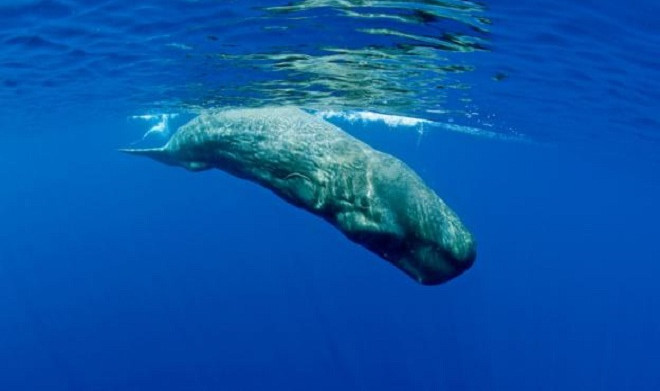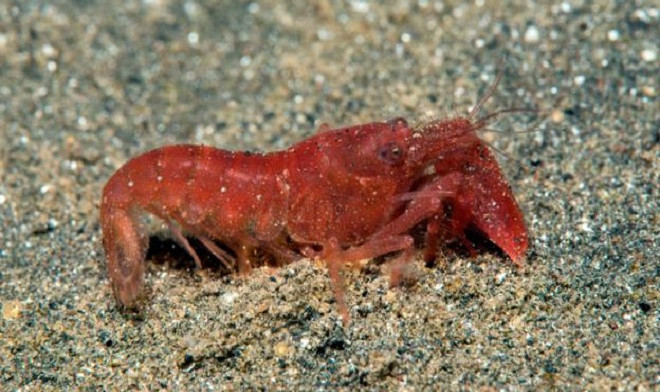The world's largest vocal animals
Many small animals like cicadas can emit loud sounds no less than sperm whales.
Lion

To measure sound, the researchers used decibels (dB) for hertz and sound pressure (Hz) with sound frequencies.Each note reaches the human ear at a different frequency: the higher the pitch, the higher the Hz.Human hearing range from 0 to 125 dB.Sound below 40 dB is difficult to hear, over 105 dB will cause pain and over 115 dB for long periods of time will cause permanent deafness.Meanwhile, humans can hear frequencies from 20 Hz to 20,000 Hz (corresponding to 20 kHz).Many sounds are in this range, from small whale songs to squeaky calls for rats.(Photo: National Geographic).
Spermaceti

The whale's call is louder than the sound of a jet engine when it takes off, recorded at 188 dB, but sperm whales make a much louder sound, up to 230 dB.In dB, sperm whales are the largest known animal on Earth today.(Photo: Franco Banfi / naturepl.com).
Shrimp knocked

Knocked shrimp, also called gun shrimp, is famous for the shrill sound when attacking.This crustacean has a special claw that can bend at high speed to create a bubble under extremely low pressure.This means that the bubble quickly breaks out when the water is outside, creating a shock wave at a frequency of 200 dB.Shrimp knocked out in a very short time: bubbles formed and broke in less than 0.001 seconds.(Photo: Constantinos Petrinos / naturepl.com).
Aphids

A small aquatic animal that also has the ability to produce loud sounds is a water bug (Micronecta Scholtzi). Water bugs produce sound at 99 dB by rubbing the penis on its belly. This is a record because the decibel in water is not equivalent to the decibel in the air. "Water is heavier than air, so the sound speed is different," BBC quoted bio sound expert James Windmill at Strathclyde University, England. "To convert from dB in water to dB in the air, about 61dB is deducted".According to Windmill, the sound produced by aphids is 160 dB.(Photo: BBC).
Elephants

Many mammals call people at a distance.In order to make sure the sound of their voices reached their homosexuals, their roar was really loud.Elephants make sounds so loud that their whole bodies shake, according to Joyce Poole, the co-founder of Elephant Voices.The sound of elephants was measured at 103 dB at a distance of 5 meters and could be deafening.(Photo: Anup Shah / naturepl.com).
Bats Noctilio leporinus

Bat species Noctilio leporinus made a sound at 140 dB when hunting on Panama lakes.However, while the elephant makes a low frequency sound, the Noctilio leporinus bats sound at a very high frequency, which is classified as 55 kHz.(Photo: Stephen Dalton / naturepl.com).
Cicada

Crickets-like insects have loud noises and they often rub their feet together to make sounds like aphids. Cicada holds the title of the most noisy insect in the world. In the 1990s, African cicadas (brevis Brevisana) possessed the loudest voice, averaging at 106.7 dB with a distance of 0.5 meters. Later, Max Molds at the Sydney, Australia Museum, recorded indigenous cicadas Cyclochila Australasiae calling at 120 dB at close range. "However, there are 3,500 cicadas in the world and relatively few species have measured sound pressure , " Lindsay Popple, a cicada expert in Australia, said.(Photo: Steven David Miller / naturepl.com).
- The culture successfully implements the artificial vocal cords that help mute people speak
- The largest animals are extinct
- Concave ear frogs call their partners with ultrasound
- Why do women often have higher voices and voices than men?
- 10 most intelligent animals on the planet
- Secret of throat protection to cheer U23 Vietnam in the historical final
- Risk of extinction of large and small species
- Compare the size of the largest prehistoric animals
- The largest big animals on the planet (Part 1)
- The truths always amaze you about the biological world
- Information about animals has a human-like genome that is over 98%
- How does the whale become the world's largest animal?
 Animal 'suffering' after hibernation
Animal 'suffering' after hibernation Why do goats climb well?
Why do goats climb well? Scientists were surprised to see chimpanzees eating turtles
Scientists were surprised to see chimpanzees eating turtles Giant catfish died deadly due to drought in Thailand
Giant catfish died deadly due to drought in Thailand